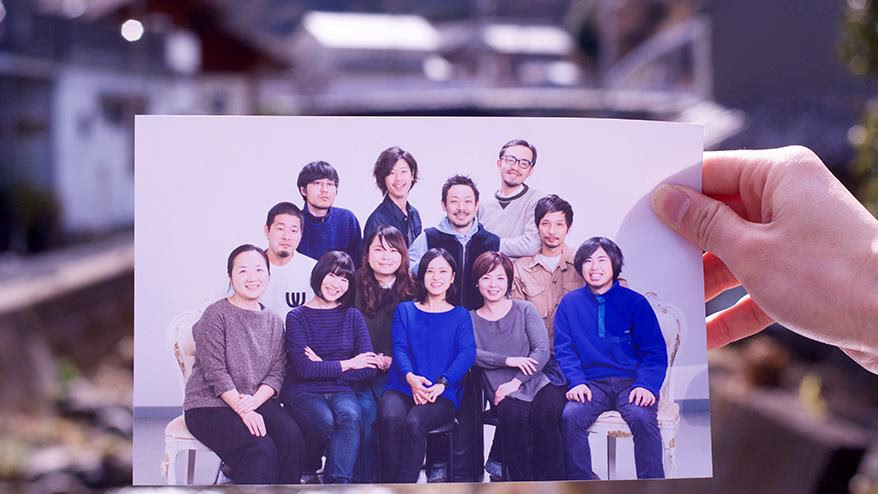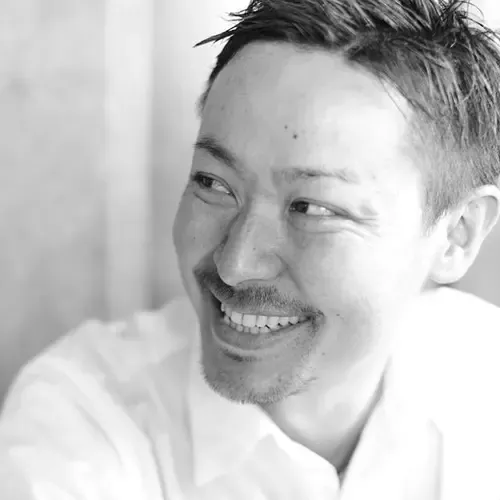Hello, I'm Kurihara, the operations team leader.
Following on from my last article , I would like to look back on the six months since I was involved in the second phase of the Kamiyama Monosasu Juku, in which I served as the principal.
In the first part, I wrote mainly about the worries I felt as the school principal. In the second part, I will write about the changes that occurred within me during my six months of living in Kamiyama.
Did you buy a life with money?
In the second term of the Kamiyama Monosasu School, we aimed to develop human resources who could become "insiders" by learning coding and writing (including interviews). ( Click here for more information about "insiders"). To achieve this, we asked for the cooperation of some wonderful guest lecturers.
The first guest lecturer was Yoshiaki Nishimura. (Please also read the interview article about Nishimura.)
What does it mean to be "inside" the client? How can you write in a "middle voice" stance in response to a client's request? Nishimura gave a packed talk on his thoughts on "how to do things," including those stances, and gave specific examples of the public, the common, and the private. (I also had the opportunity to listen to the talk along with the students.)
The one that left the strongest impression on me was,
"For most people, it's just a matter of 'are you working?' or 'are you paying?'"
These were Nishimura's words.
It was as if they were speaking to me personally...these words applied perfectly to me.
I worked during the day, had dinner at a restaurant or the nearest convenience store late at night, and then went to sleep...I repeated this every day, and I realized that my "life" was made up of the services I received from restaurants and other places I paid money.
I realized that we buy our "life" with money and live our "life."
That's not to say that it's necessarily a bad thing, but this comment made me realize that I was placing a very large emphasis on buying my "lifestyle" with money, and that I hadn't given any thought at all to my own "lifestyle."
The feeling that work and life are one and the same
To digress a little, the reason Monosus opened a satellite office in Kamiyama Town is because of the feelings that our CEO, Hayashi, has for us.
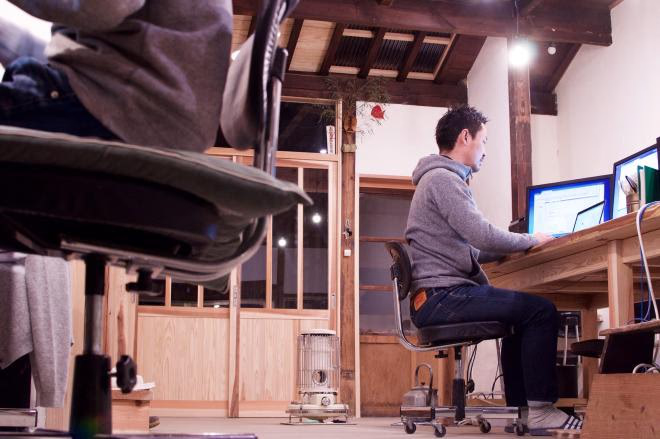
On the 1st floor of the satellite office.
This means that we want each employee to think about their own way of working and living.
The company has a role to play in providing an opportunity for such thinking. With this in mind, we decided to open a satellite office in Kamiyama, as a place to increase the options for where to work and to think about how to live and work (although this was not the only purpose of the establishment).
Some people find life in Tokyo to be suitable, while others find life in a place surrounded by nature like Kamiyama to be suitable, and others find it to be unsuitable. We want everyone to be able to work and live a life that suits them.
I believe that this is the message that our CEO, Hayashi, is sending us.
Even though I worked for such a company, to be honest, I thought that leaving my life in Tokyo and living in the countryside was something that didn't concern me.
Through an unexpected turn of events, I ended up living in Kamiyama Town as the principal of Kamiyama Monosasu Juku. As I listened to Nishimura's lectures, heard messages from Hayashi, and witnessed students interested in life in the countryside living vibrantly in Kamiyama, I was forced to reexamine my own lifestyle.
For example, unlike Tokyo, where there are plenty of options for eating, the nearby shops in Kamiyama close early. Of course, there are only a few restaurants where you can eat... If you work overtime until late, you can easily become a dinner refugee. You have to think about dinner, which you never had to think about while at work, and do the shopping.
In this environment where I was almost forced to think about my lifestyle, I began to compare every single aspect of my life with my life in Tokyo.
| Tokyo | Kamiyama | |
|---|---|---|
| commute | 2 hours one way (4 hours per day) | Door to door in 10 minutes (20 minutes a day) |
| meal | Eating out is the main | I mainly cook my own meals using the vegetables I've been given. |
| health | I suffer from back pain every day. I always get sick when the seasons change. | The back pain has improved a lot. I'm in great health, probably because I've started eating more vegetables. |
| communication | Basically no contact with people outside the company | When I meet the aunties in the neighborhood, we chat about everyday things. Junior high school students greet you cheerfully when you pass them. |
A table comparing life in Tokyo and Kamiyama. Everything from commuting to communication has changed dramatically.
By doing something stupidly,
You can get everyone involved and have fun.
I was also greatly influenced by the days I spent with the students.
The catchphrase for this seminar was "Work with people you want to live with," so naturally, people gathered not only to learn web skills, but also to find a place to think about their future ways of working and living.
I know I shouldn't say this, but even if I was a part-time worker and wanted to study web engineering, I definitely wouldn't apply to Kamiyama Monosasu Juku (laughs). Living in the countryside was not an option for me, so I don't think I would be able to relate to studying web engineering in Kamiyama... I wish I could do it in Tokyo.
The presence of students who had views completely opposite to mine gave me the opportunity to reexamine my own way of life.
From my perspective, the students are level-headed, free, proactive, and have their own goals. It may sound exaggerated, but in a very good sense, they are "free and cool."
For me, who had never really thought about how to work or live, the students were as intriguing as a new species of living creature, and I wanted to talk to them more.
However, after the lectures, I was busy preparing for the next day, meeting about my regular work, and preparing for the opening of a satellite office, so I couldn't find the time I wanted... Like a lion in a cage, I spent each day feeling frustrated, but the students started inviting me to meals, planning sports tournaments and events, and giving me more opportunities to have fun together.
What I felt while watching the students was that they faced everything head on and gave everything they could to the fullest. They rented a house in Kamiyama (living deep in the mountains, living in a wood-burning bath, etc.), and were busy every week, saying things like "I went to this place on my day off," but they were enjoying and living in their own way in their current environment in Kamiyama, Tokushima, and Shikoku.
In particular, at the 4K Film Festival held in November, they set up a street-level stall where people could grab Yuzu snacks.
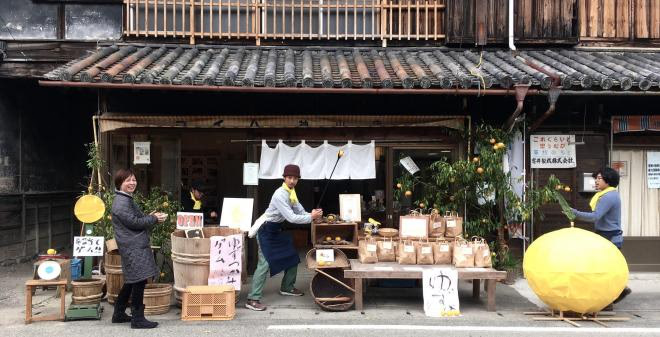 The one-day only "Yuzu Street Shop." The big yellow object is a portable shrine (handmade, of course) dedicated to the Yuzu god.
The one-day only "Yuzu Street Shop." The big yellow object is a portable shrine (handmade, of course) dedicated to the Yuzu god.
The man had a lot of yuzu trees on his property and wanted to sell them. So the cost price was free.
However, in Kamiyama, where sudachi and yuzu are abundant, yuzu is "not something you buy, but something you receive." Who pays the money to buy it? The students thought that they would not sell as is, so they tried to add value to the yuzu by making it into a game, such as using a magic hand to grab a yuzu (30 seconds) or bringing out a weighing scale, which was used in physical examinations in elementary school, from their shed at home and having people guess the weight of the yuzu.
To make the game more enjoyable, we recorded our own voices to create sound effects to play during the game (Yuzu! Yuzu! Yuzu! It's hard to explain, but it's a thrilling sound effect), and we made a portable shrine dedicated to the Yuzu god, "Yuzu God." We were thinking of ways to make the game more enjoyable.
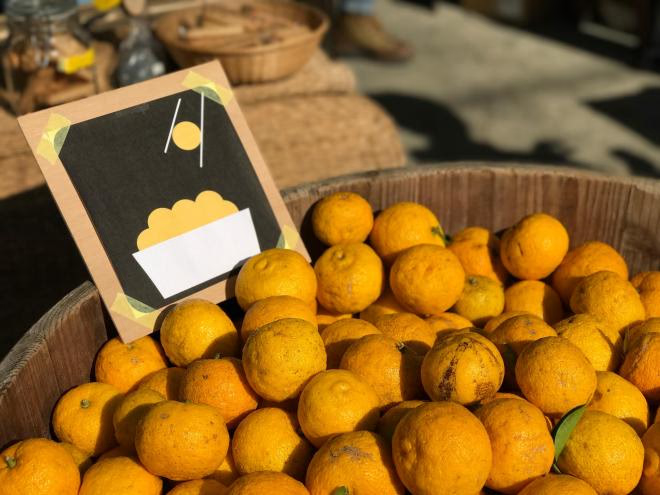
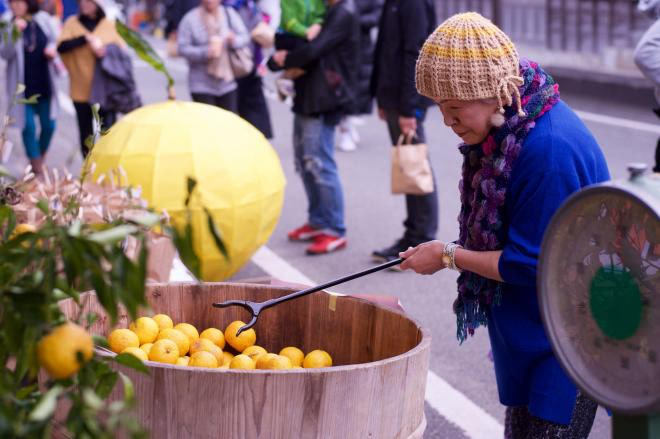 The yuzu grab game was a great success. Some locals paid to play the game, but when they won, they said, "I have plenty at home, so I don't need these."
The yuzu grab game was a great success. Some locals paid to play the game, but when they won, they said, "I have plenty at home, so I don't need these."
He was such a complete idiot that I couldn't help but laugh and say, "How stupid."
(I'm praising you.)
By going all out in an ridiculous way, you can get everyone involved and have fun.
Seeing the way they approached things made me feel that I too would be missing out if I didn't act as foolish as possible in my current environment, so I began to enjoy my life in Kamiyama to the fullest.
I'm not completely stupid yet though.
I want to find my own way of doing things

Kamiyama is a place where many people move to in order to experience life and work in the countryside. My reason for coming to Kamiyama was to do my job as a school principal, and I thought I would return to Tokyo after it was over.
However, although the environment is particularly inconvenient compared to Tokyo, it is precisely because of this inconvenience that I have more time to face my daily life and have time to think about it, which has changed my attitude.
Face the present situation, enjoy it, and give it a try.
The same goes for work. Coming to Kamiyama doesn't mean placing emphasis on life, but rather that life is important. It's not about reducing the amount of work, but about balancing it with life, which was previously heavily weighted towards work.
If work overflows from the act of living, I think of ways to do it. If I don't have time, I can just do it on the weekend. There are many ways of thinking about this, but for now, I'll try doing it this way. If it doesn't work, I'll try a different way. By repeating trial and error like this, I am trying to find my own way of doing things.
For these reasons, I wanted to stay in Kamiyama even after the cram school ended, and I wanted to continue taking on new challenges, so I chose to continue living in Kamiyama.
(After the school closed, I transferred my residence at the end of last year and officially became a resident of Kamiyama town. I would appreciate everyone in Kamiyama continuing to support me.)
Although it is possible to imagine what things will be like in a few years, no one really knows what they will be like then.
I plan to follow my feelings and true self, enjoy the choices I've made to the fullest, and keep moving forward even after failures.
Looking back on 172 days in Kamiyama
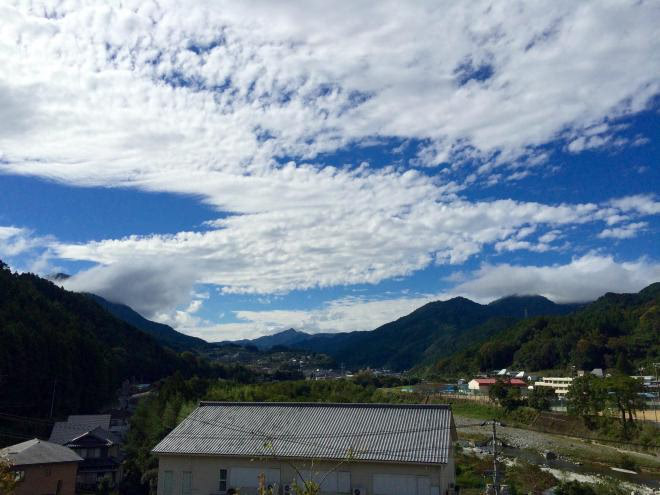 This is a view from the Kamiyama Town Rural Environment Improvement Center, managed by Green Valley, where the Kamiyama Monosasu School was held.
This is a view from the Kamiyama Town Rural Environment Improvement Center, managed by Green Valley, where the Kamiyama Monosasu School was held.
When I counted the number of days in the Kamiyama Monosasu Juku program on a calendar, it was 172 days.
It's moving to think that these 172 days were spent in Kamiyama town by 12 people, including 10 students, student and administrative staff member Furuhat, and myself.
Kamiyama Monosasu Juku was only possible thanks to the cooperation of so many people.
Nishimura Yoshitetsu taught us how to run a business, how to listen to people, and how to interview.
The person in charge of the writing course was Tochizawa Keiji.
The camera class was taught by Masaya Abe and Nao Kondo.
We would like to thank everyone involved, including Mr. Kidoin, who we asked to conduct the regional coordination course.
Also, Gota supported the coding curriculum.
Members of the operations team who taught the operations curriculum.
Ito flew over to work as a coding instructor immediately after returning from Monosus Thailand.
Monosus members, including Iwaki, provided full support to the school from Tokyo.
The members of the operations team who provided solid support for the business while I was away.
And to everyone at Green Valley who welcomed us into the classroom with smiles every day.
The people of Kamiyama Town have supported me in many ways in my daily life.
Too many people helped me to list them all here.
There were many things that we did not consider and we apologize for causing you inconvenience in many ways.
I would like to say this again and again, thanks to all of you, all 10 students were able to graduate.
Thank you very much.
Kamiyama Monosasu Juku is a place where I have had the opportunity to meet so many people, including other students.
I feel that those 172 days were an opportunity for me to grow significantly as a person.
Finally, to all the students
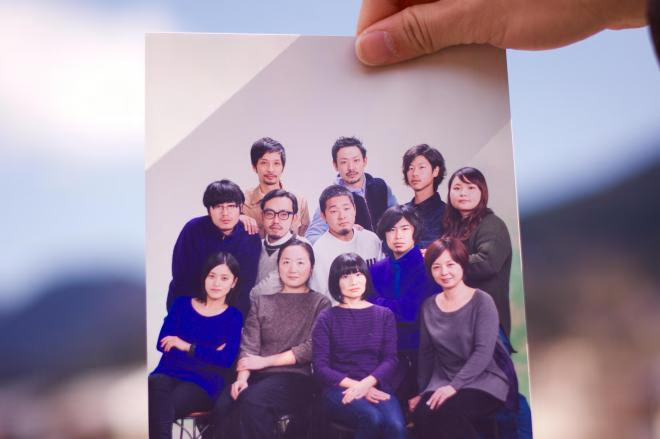 We asked Nao Kondo of Kurara Photo Studio in Kamiyama-cho, who was also our instructor for the photography course, to take a group photo to commemorate our graduation. Unlike the main photo, this one shows everyone making a serious face. It makes me laugh every time I see it. Thank you, Kondo-san.
We asked Nao Kondo of Kurara Photo Studio in Kamiyama-cho, who was also our instructor for the photography course, to take a group photo to commemorate our graduation. Unlike the main photo, this one shows everyone making a serious face. It makes me laugh every time I see it. Thank you, Kondo-san.
The students were all very considerate of each other. They naturally played their roles and were blessed with really great members, which made for a great team.
I am grateful to have had the opportunity to spend my time at the school with these people and to have walked this path together with them.
I wonder if I was doing a good job as the principal of Kamiyama Monosasu Juku, or if there were things the students would have liked me to do more of.
But I will be happy if even a little of what you learned in Kamiyama has remained with you all.
Those who stayed in Kamiyama, those who went to Tokyo, those who went to Thailand, and those who returned to their hometowns have each made their own decisions and decided on their next path. We will continue to support them in their choices.
If you need anything, please call me anytime.
Well, good luck wherever you are. I hope we can meet again in Kamiyama. Let's get together.
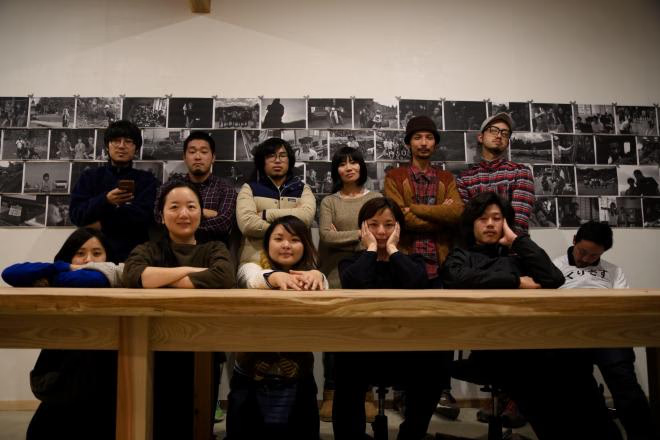
After the graduation party, we took a final commemorative photo while the principal (far right) was fast asleep lol.
